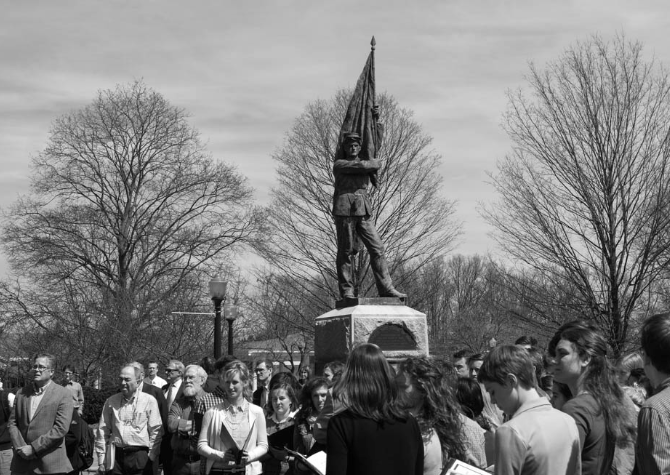
White House Chief of Staff, Gen. John Kelly, in an impassioned speech a couple of weeks ago lamented the growing loss of sacredness he has seen in America throughout his life — from the treatment of women, to life, to religion. He addressed the issue during a daily press briefing, after being stunned by the news that a member of the House of Representatives had desecrated one of the last vestiges of sacredness in the country, the treatment of dead soldiers.
As I heard Kelly’s remarks, I thought of the nature of sacred spaces and the honor those places are due. Such a place on campus is the Alpha Kappa Phi statue built in 1895 to “recognize the Civil War honor of more than 500 Hillsdale College soldiers who dutifully answered the call of their country.” Although the space where the monument sits is used in ways that accentuate its sacredness, like the 9/11 memorial or the unveiling of the Frederick Douglass statue, the business of day-to-day life can distract us to think of it as nothing more than the shortest path between the doors of Kendall and Lane halls. If efficiency is our goal, then there is nothing wrong with that, but perhaps our actions should be guided by more than valueless considerations.
The word sacred comes from the Latin sacrare which means to consecrate, immortalize, to set apart. A sacred space is one that is set apart to honor and bring reverence to something or someone. Hillsdale College is building Christ Chapel as a place set apart to honor and worship God. The Civil War monument was built to the “memory of our heroic dead who fell in defense of the Union.” This is a sacred space. A space that has been set apart to bring honor and reverence to individuals whose selfless actions have made them worthy of deep respect. Among those memorialized there are three generals, three colonels, five lieutenant colonels, three Congressional Medal of Honor recipients, and hundreds of students from our own college whose actions helped save the Union.
The Taft statue and its surrounding area is a space that should be set apart. As such, it should not be used for mundane reasons, nor for any other reason than that for which it was intended except in extraordinary circumstances. Shaving a few seconds off one’s walk from class does not qualify as an extraordinary circumstance. Perhaps this is much ado about nothing, but in our culture, which increasingly replaces objective value with efficiency, Gen. Kelly’s call to the nation to save the last vestiges of sacredness rings true. Honoring dead American soldiers is important, perhaps we should err on the side of it being more than nothing.
Juan Davalos is a graduate student.

